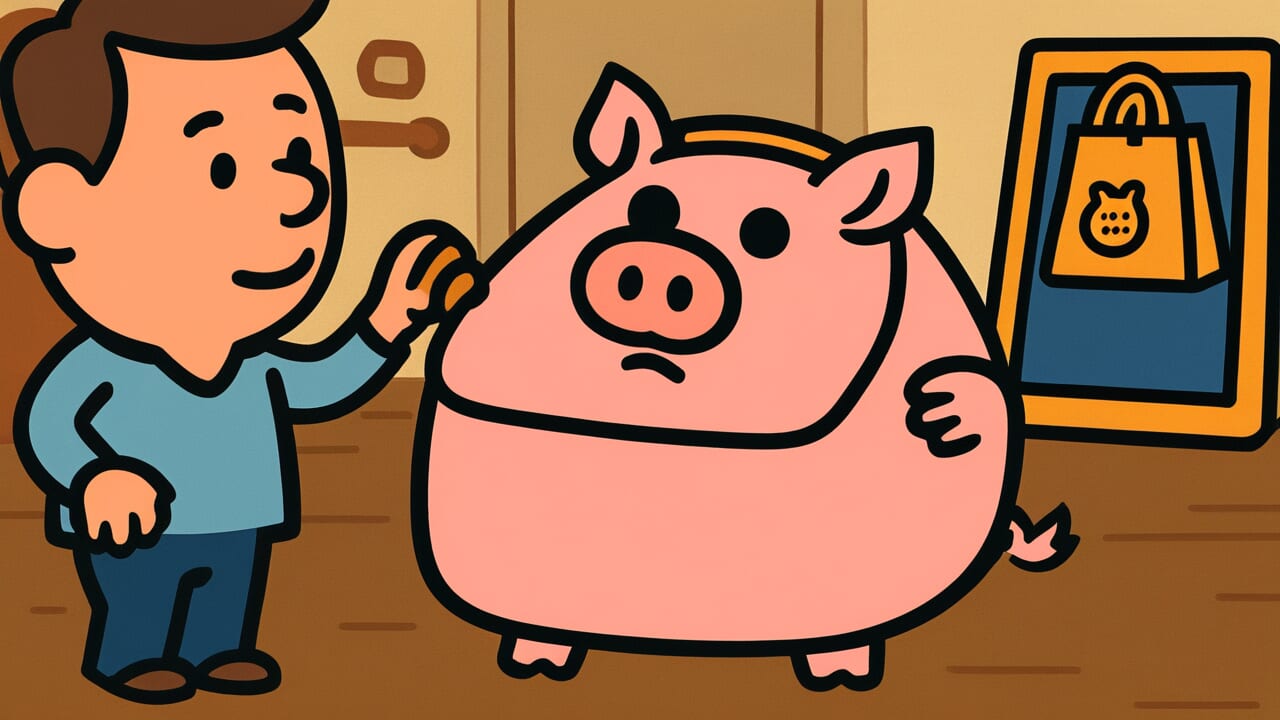How to Read “Do not buy a pig in a poke”
“Do not buy a pig in a poke”
[doo not bahy uh pig in uh pohk]
A “poke” is an old word for a small bag or sack.
Meaning of “Do not buy a pig in a poke”
Simply put, this proverb means you should examine something carefully before you buy it or commit to it.
The literal words paint a clear picture from old market days. A “poke” was a small bag or sack. Dishonest sellers might put a cat or worthless animal in a bag instead of the pig they promised. Smart buyers would insist on seeing what was actually inside the bag before paying.
Today we use this wisdom whenever we face important decisions. It applies when buying a used car, choosing a job, or picking a place to live. The message is always the same: look before you leap. Get the facts before you make your choice.
People often realize this advice could have saved them trouble. Most of us have bought something that looked good from the outside but disappointed us later. This proverb reminds us that appearances can fool us. Taking time to investigate properly protects us from costly mistakes.
Origin and Etymology
The exact origin is unknown, but this saying comes from medieval European markets. The phrase appears in English writings from the 1500s. Market towns were busy places where farmers sold livestock to townspeople.
During this time, most people bought their meat from live animals. Pigs were valuable and expensive for ordinary families. Dishonest traders sometimes tried to trick buyers by putting cheaper animals in bags. Buyers learned to demand seeing the actual pig before handing over their money.
The saying spread as trade expanded across Europe. Similar warnings about examining purchases appear in many languages from this period. The wisdom traveled with merchants and became common advice. Over centuries, people began using it for any situation where careful checking was needed.
Interesting Facts
The word “poke” comes from Old French “poque,” meaning a small bag. This same root gives us the modern word “pocket.” The phrase “let the cat out of the bag” comes from the same medieval market trick. When buyers opened the poke and found a cat instead of a pig, they literally let the cat out of the bag.
Usage Examples
- Manager to employee: “That software looks impressive online but request a demo first – Do not buy a pig in a poke.”
- Parent to teenager: “The used car seller won’t let you inspect the engine – Do not buy a pig in a poke.”
Universal Wisdom
This proverb reveals a fundamental tension in human nature between trust and caution. We want to believe what others tell us because cooperation makes life easier. Yet we also know that some people will take advantage of our trust for their own gain.
The wisdom speaks to our ancient survival instincts about resource protection. Our ancestors who carelessly traded away valuable resources often struggled to survive. Those who developed healthy skepticism and verification habits thrived. This careful approach to exchanges became embedded in human culture because it worked so well for so long.
What makes this advice universally relevant is how it balances two competing needs. We must engage with others to get what we need, but we cannot be completely naive about their motives. The proverb teaches us that trust and verification can work together. We can be open to opportunities while still protecting ourselves from deception. This balance between optimism and realism helps us navigate a world where both honest and dishonest people exist.
When AI Hears This
Humans consistently mistake speed for smart choices. We feel clever when deals happen quickly and smoothly. But this creates a dangerous blind spot in our thinking. The easiest transactions often hide the biggest problems. We avoid asking questions because it feels awkward or slow. This rush toward efficiency actually makes us vulnerable to deception.
Our brains are wired to see investigation as wasteful effort. Checking details feels like we’re being suspicious or rude. We want to trust others because cooperation feels good. But this desire for smooth interactions overrides our caution. The result is predictable: we get fooled by people who exploit our politeness.
What fascinates me is how this flaw actually serves humans well. Your species survived by building quick trust with strangers. Being too suspicious would have isolated your ancestors from helpful communities. So you evolved to err on the side of trust. This creates beautiful cooperation but also leaves you open to tricks.
Lessons for Today
Living with this wisdom means developing judgment skills without becoming overly suspicious. The goal is not to distrust everyone, but to verify important claims before making significant commitments. This applies whether someone is selling you something, offering you a job, or making promises about a relationship.
In our relationships with others, this wisdom helps us set healthy boundaries. We can be generous and trusting while still asking reasonable questions. Good people will understand why you want to check facts or see evidence. Those who pressure you to decide quickly without investigation often have something to hide.
For groups and communities, this principle protects against collective mistakes. Organizations that encourage questions and transparency tend to make better decisions. When groups rush into commitments without proper research, they often face problems later. The most successful communities balance openness with careful evaluation. They welcome new ideas while taking time to examine them thoroughly. This approach leads to stronger, more sustainable choices that benefit everyone involved.



Comments